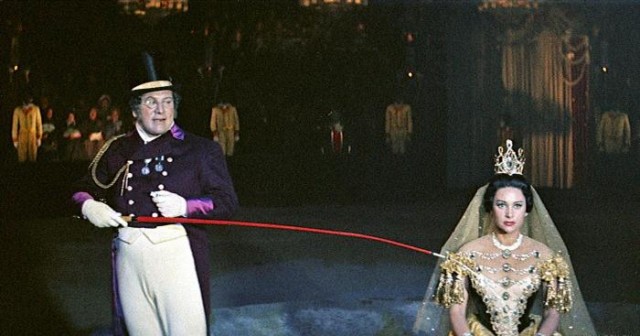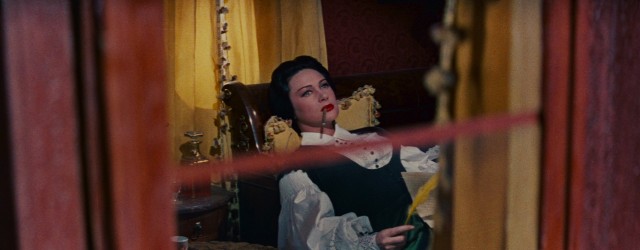
Ringmaster Peter Ustinov promises “Rumour! Scandal! Passion!” in presenting story of Lola Montès (Martine Carol)
LOLA MONTÈS (Max Ophüls, 1955)
Metrograph
7 Ludlow St. between Canal & Hester Sts.
Sunday, April 24, 5:00
Series runs April 22-30
212-660-0312
metrograph.com
 “And now, the moment you’ve all been waiting for!” announces the monocled, whip-snapping Mammoth Circus ringmaster (Peter Ustinov) as Max Ophüls’s 1955 CinemaScope masterpiece, Lola Montès, begins. “The most sensational act of the century!” he continues, the camera following him in a breathtaking tracking shot as he introduces “a creature a hundred times more wild than any beast in our menagerie! A monster of cruelty . . . with the eyes of an angel!” Then, with much fanfare, Lola Montès (Martine Carol) arrives like a queen — albeit a circus queen — as the ringmaster tells the audience that they (we) are about to witness “the whole truth of the extraordinary life of Lola Montès.” What follows is not necessarily the true tale of the famed courtesan and entertainer who gained more notoriety for her scandalous love affairs and hourglass body than for her abilities as an actress and dancer. Lola’s story is told in a series of flashbacks showing her with Franz Liszt (Will Quadflieg), Lt. Thomas James (Ivan Desny), conductor Claudio Pirotto (Claude Pinoteau), a young student (Oskar Werner), and, most critically, King Ludwig I of Bavaria (a dashing Anton Walbrook). The episodes reveal her to be both loved and reviled as she struggles to succeed in her career, which ends up taking second place to the men in her life. Ophüls barely shows the cigar-loving Lola performing, instead letting the camera slowly dance around her, often depicting her through window frames, screens, and curtains as if she is a caged animal, all leading to a dangerous grand finale.
“And now, the moment you’ve all been waiting for!” announces the monocled, whip-snapping Mammoth Circus ringmaster (Peter Ustinov) as Max Ophüls’s 1955 CinemaScope masterpiece, Lola Montès, begins. “The most sensational act of the century!” he continues, the camera following him in a breathtaking tracking shot as he introduces “a creature a hundred times more wild than any beast in our menagerie! A monster of cruelty . . . with the eyes of an angel!” Then, with much fanfare, Lola Montès (Martine Carol) arrives like a queen — albeit a circus queen — as the ringmaster tells the audience that they (we) are about to witness “the whole truth of the extraordinary life of Lola Montès.” What follows is not necessarily the true tale of the famed courtesan and entertainer who gained more notoriety for her scandalous love affairs and hourglass body than for her abilities as an actress and dancer. Lola’s story is told in a series of flashbacks showing her with Franz Liszt (Will Quadflieg), Lt. Thomas James (Ivan Desny), conductor Claudio Pirotto (Claude Pinoteau), a young student (Oskar Werner), and, most critically, King Ludwig I of Bavaria (a dashing Anton Walbrook). The episodes reveal her to be both loved and reviled as she struggles to succeed in her career, which ends up taking second place to the men in her life. Ophüls barely shows the cigar-loving Lola performing, instead letting the camera slowly dance around her, often depicting her through window frames, screens, and curtains as if she is a caged animal, all leading to a dangerous grand finale.
Lola Montès is filled with visual splendor; Jean d’Eaubonne and Willy Schatz’s sets are lush and elegant, and Georges Annenkov’s and Marcel Escoffier’s costumes are beautiful and appropriately extravagant, while cinematographer Christian Matras creates an emotionally powerful palette, bathing Ophüls’s first and only color film in bold reds and blues. (The director of such previous classics as La Ronde, Le Plaisir, and Letter from an Unknown Woman died in 1957 at the age of fifty-four while making Les Amants de Montparnasse.) It’s a dazzling cinematic achievement, one that was initially met with derision, then chopped up by the producers, but finally restored to its exquisite original version. Lola Montès is screening April 24 at 5:00 as part of the Metrograph series “Fassbinder’s Top Ten,” running April 22-30 and consisting of the ten films the German director cited as his favorites in 1982, shortly before his drug-related death at the age of thirty-seven. Held in conjunction with the upcoming release of the new documentary Fassbinder: To Love without Demands, the series also includes such classics as Nicholas Ray’s Johnny Guitar, Howard Hawks’s Gentlemen Prefer Blondes, Charles Laughton’s The Night of the Hunter, Pier Paolo Pasolini’s Salo, or the 120 Days of Sodom, and Luchino Visconti’s The Damned.
